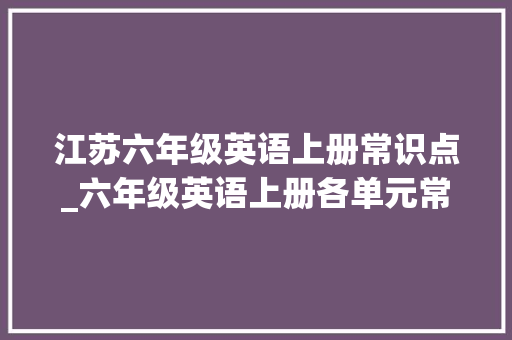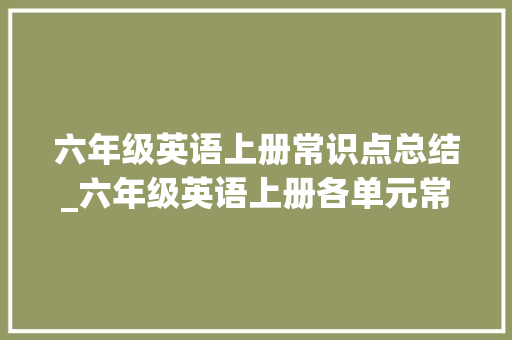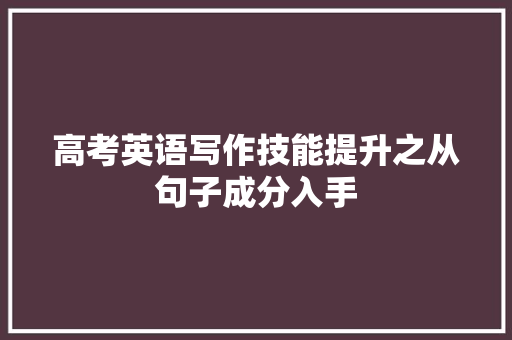中考英语固定句子复习1
A。 How B。 What C。 Which D。 Where
( ) 2。 It's hot here。 Why not _______ your coat?

A。 put on B。 dress up C。 try on D。 take off
( ) 3。 He has never visited the Great Hall of the People, _______?
A。 hasn't he B。 has he C。 does he D。 doesn't he
( ) 4。 In the street I met the scientist _______ gave us a talk last week。
A。 he B。 which C。 who D。 what
( ) 5。 —Do you know _______? ——Next year。
A。 when he came here B。 when did he come here
C。 when he will come here D。 when will he come here
( ) 6。 You will be able to get good marks _______。
A。 until you follow your teachers' advice
B。 if you do some revision every day
C。 before you begin to study hard
D。 while you are doing your homework by yourself
( ) 7。 Jim's father said to him, I hope you _______ what _______ you to buy。
A。 didn't forget; told B。 not to forget; have told
C。 won't forget; have told D。 haven't forgotten; will tell
( ) 8。 I want to know _______。
A。 what is his name B。 what's hi name C。 that his name is D。 what his name is
( ) 9。 Could you tell me _______?
A。 where can I buy this kind of CD player
中考英语固定句子复习2
( )1。 —It's a bit cold。 Would you mind my all the windows?
— Do as you like, please。
A。 close B。 will close C。 closing D。 to close
( )2。 —The shoes are very nice。 I'll take them。
—But you must first。 I think the size is a bit small for you。
A。 pay for them B。 try them on C。 put them on D。 Take them off
( )3。 A survey show that kid in UK are the unhappiest, though it is among the richest countries in the world。 , lot of money doesn't mean a happy childhood。
A。 That is o say B。 As a result C。 For example D。 Above all
( )4.一 ________ is your new watch? 一It's only twenty yuan。
A.How B.How long C.How much D.How many
推荐阅读:
一、陈述句:
陈述句是用来陈述一个事实或表达说话人看法(包括肯定和否定)的句子,中考英语总复习:句子考查点分项讲解。通常用降调,句末用句号“。”。
Tom has a new car。汤姆有辆新车。
The flower isn’t beautiful。这花不美。
二、陈述句否定式的构成
1。如果肯定陈述句的谓语部分含有助动词、情态动词或连系动词be,则只需在这些动词后加not即可构成否定式。
He is playing the guitar。他正在弹吉他。(肯定)
He is not playing the guitar。他不在弹吉他。(否定)
We can get there before dark。天黑前我们能够到达那里。(肯定)
We can’t get thee before dark。天黑前我们不能到达那里。(否定)
2。如果陈述句的谓语动词是实义动词,而其中又没有情态动词或助动词时,则需根据人称和时态在该实义动词前加don’t, doesn’t或didn’t。同时把该实义动词变为原形。
He plays the violin well。他小提琴拉的很好。(肯定)
He doesn’t play the violin well。他小提琴拉的不好,中小学英语《中考英语总复习:句子考查点分项讲解》。(否定)
She won the game。她赢得了比赛。(肯定)
She didn’t win the game。她没赢比赛。(否定)
三、祈使句:
祈使句是用来表示命令、请求、建议、号召等的句子,谓语动词用原形,句末用感叹号“!”或句号“。”。朗读时一般用降调。
1。肯定的祈使句:
(1)祈使句主语是you时,you常省略,但如果要特别强调对方或表达某种强烈的情绪时可以有主语或称呼语。
Be quiet。请安静。
You be quiet!你给我安静点!
(2)“Do+祈使句”表示一种强烈的感情或请求,do起强调作用。
Do come back at once!务必立即返回!
Do be careful。务必小心。
(3)please用在祈使句中可以表示一种客气的语气,但please用在句末时,必须用逗号与其余部分分开。
Open the window, please。请打开窗户。
(4)Let引导祈使句时,后面需跟上人称代词或称呼语,人称代词一般只用第一、第三人称。
Let Jack wait a minute。让杰克等一会。
Let’s go to school。我们上学去吧。
(5)在祈使句中,Let’s和Let us是有区别的。Let’s包括说话者,而Let us不包括说话者在内。这点从反意疑问句时可明显看出。
Let’s go skating, shall we?咱们去溜冰吧,好吗?(表示内部的建议)
Let us try again, will you?让我们再试一次,好吗?(表示向别人发出请求)









